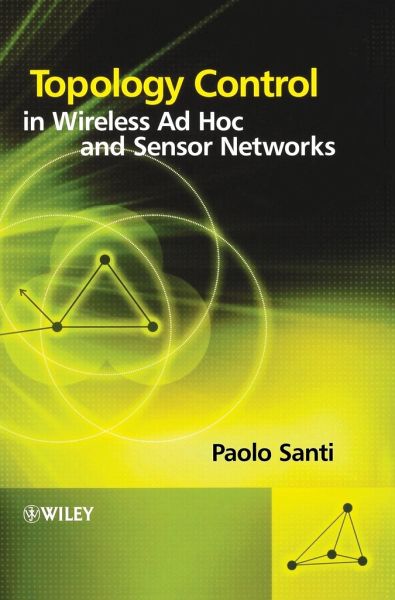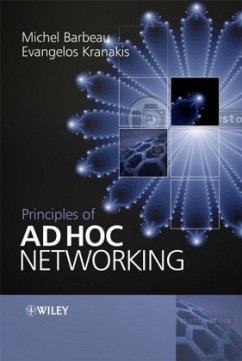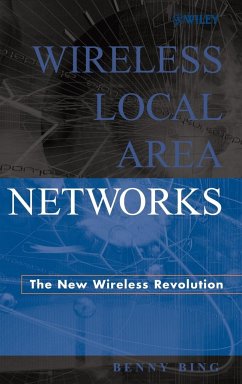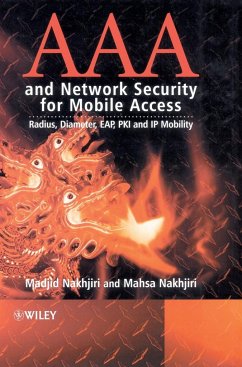
Topology Control in Wireless AD Hoc and Sensor Networks

PAYBACK Punkte
58 °P sammeln!
Topology control is fundamental to solving scalability and capacity problems in large-scale wireless ad hoc and sensor networks.Forthcoming wireless multi-hop networks such as ad hoc and sensor networks will allow network nodes to control the communication topology by choosing their transmitting ranges. Briefly, topology control (TC) is the art of co-ordinating nodes' decisions regarding their transmitting ranges, to generate a network with the desired features. Building an optimized network topology helps surpass the prevalent scalability and capacity problems.Topology Control in Wireless Ad ...
Topology control is fundamental to solving scalability and capacity problems in large-scale wireless ad hoc and sensor networks.
Forthcoming wireless multi-hop networks such as ad hoc and sensor networks will allow network nodes to control the communication topology by choosing their transmitting ranges. Briefly, topology control (TC) is the art of co-ordinating nodes' decisions regarding their transmitting ranges, to generate a network with the desired features. Building an optimized network topology helps surpass the prevalent scalability and capacity problems.
Topology Control in Wireless Ad Hoc and Sensor Networks makes the case for topology control and provides an exhaustive coverage of TC techniques in wireless ad hoc and sensor networks, considering both stationary networks, to which most of the existing solutions are tailored, and mobile networks. The author introduces a new taxonomy of topology control and gives a full explication of the applications and challenges of this important topic.
Topology Control in Wireless Ad Hoc and Sensor Networks:
_ Defines topology control and explains its necessity, considering both stationary and mobile networks.
_ Describes the most representative TC protocols and their performance.
_ Covers the critical transmitting range for stationary and mobile networks, topology optimization problems such as energy efficiency, and distributed topology control.
_ Discusses implementation and 'open issues', including realistic models and the effect of multi-hop data traffic.
_ Presents a case study on routing protocol design, to demonstrate how TC can ease the design of cooperative routing protocols.
This invaluable text will provide graduate students in Computer Science, Electrical and Computer Engineering, Applied Mathematics and Physics, researchers in the field of ad hoc networking, and professionals in wireless telecoms as well as networking system developers with a single reference resource on topology control.
Forthcoming wireless multi-hop networks such as ad hoc and sensor networks will allow network nodes to control the communication topology by choosing their transmitting ranges. Briefly, topology control (TC) is the art of co-ordinating nodes' decisions regarding their transmitting ranges, to generate a network with the desired features. Building an optimized network topology helps surpass the prevalent scalability and capacity problems.
Topology Control in Wireless Ad Hoc and Sensor Networks makes the case for topology control and provides an exhaustive coverage of TC techniques in wireless ad hoc and sensor networks, considering both stationary networks, to which most of the existing solutions are tailored, and mobile networks. The author introduces a new taxonomy of topology control and gives a full explication of the applications and challenges of this important topic.
Topology Control in Wireless Ad Hoc and Sensor Networks:
_ Defines topology control and explains its necessity, considering both stationary and mobile networks.
_ Describes the most representative TC protocols and their performance.
_ Covers the critical transmitting range for stationary and mobile networks, topology optimization problems such as energy efficiency, and distributed topology control.
_ Discusses implementation and 'open issues', including realistic models and the effect of multi-hop data traffic.
_ Presents a case study on routing protocol design, to demonstrate how TC can ease the design of cooperative routing protocols.
This invaluable text will provide graduate students in Computer Science, Electrical and Computer Engineering, Applied Mathematics and Physics, researchers in the field of ad hoc networking, and professionals in wireless telecoms as well as networking system developers with a single reference resource on topology control.














